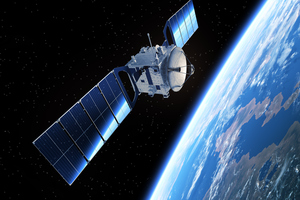CMA provisionally clears satellite comms deal following in-depth review
The decision comes after a Phase 2 review revealed Viasat and Inmarsat will likely face significant competition from both emerging and established players as the sector expands.

- While Viasat and Inmarsat compete closely, the merged company would be challenged by new competitor Starlink, as well as established firms like Intelsat and Panasonic, in the coming years
- The satellite communications sector is rapidly expanding – a trend that is expected to continue
- As the sector grows, airlines will have more options to choose from when selecting a provider for on-board wifi services
Satellite communications firms Viasat and Inmarsat – which agreed to merge in November 2021 – supply businesses globally with satellite connectivity that enables services such as internet, email, and video calling, including for use in aircraft.
The Competition and Markets Authority (CMA) referred the deal to an in-depth Phase 2 inquiry after identifying competition concerns during its initial, Phase 1, investigation.
Over the past 4 months, an independent CMA panel has gathered and scrutinised a wide range of evidence in order to better understand the sector, as well as the potential impact of the deal. This included internal documents from Viasat and Inmarsat, as well as the companies’ competitors (including their plans for future expansion); evidence from airlines; the CMA’s own analysis of sector conditions – and how these could change.
In a Phase 2 review, the panel considers whether it is more likely than not that a deal will lessen competition – a higher threshold than Phase 1. Accordingly, some mergers that are referred to Phase 2 will ultimately be cleared.
The CMA’s investigation into the Viasat/Inmarsat deal has provisionally found that, while the companies compete closely in the aviation sector – specifically in the supply of satellite connections for onboard wifi – the deal does not substantially reduce competition for services provided on flights used by UK customers.
The CMA’s investigation has found that the satellite sector is expanding rapidly – a trend the evidence suggests is likely to continue. This is due to increased demand for satellite connectivity, driven in large part by the ever-growing use of the internet by businesses and consumers both at home and whilst travelling.
The satellite industry has seen a number of new players entering – or planning to enter – the sector, including Starlink (operated by SpaceX), which is rapidly increasing its presence in the provision of satellite connections to aircraft. During our investigation, the firm has launched a significant number of additional satellites and won its first contract with a European airline, airBaltic.
Established competitors, such as Panasonic and Intelsat, are also investing and entering into new partnerships. For example, both firms have signed agreements with recent entrant OneWeb to use its satellite fleet to enhance their offerings to airlines.
Richard Feasey, chair of the independent inquiry group carrying out the Phase 2 investigation, said:
This is an evolving and rapidly expanding sector, in which there have been significant developments even during the course of our 4-month investigation. We see this continuing as demand for satellite connectivity increases.
While Viasat and Inmarsat compete closely, the evidence suggests that the merged company will face significant competition in the coming years – from both emerging players like Starlink and from established firms like Intelsat and Panasonic.
This competition has led us to provisionally conclude that airlines and their UK customers will not be adversely affected by the deal.
Today’s findings are provisional, and the CMA will now consult on its findings and listen to any further views before reaching a final decision.
The CMA welcomes responses from interested parties to its provisional findings by 21 March 2023. These will be considered ahead of the CMA issuing its final report, which is due by 30 March 2023.
For more information, visit the Viasat / Inmarsat merger inquiry page.
Notes to editors:
- For media enquiries, contact the CMA press office on 020 3738 6460 or [email protected].
- The Secretary of State for Business, Energy and Industrial Strategy carried out a separate investigation and made a final order pursuant to section 26 of the National Security and Investment Act 2021 to provide assurance that (i) controls are in place to protect information from unauthorised access and (ii) strategic capabilities continue to be provided by Inmarsat and Viasat to the UK government.
- Under the Enterprise Act 2002, the CMA has a duty to make a reference to Phase 2 if the CMA believes that it is or may be the case that a relevant merger situation has been created, or arrangements are in progress or contemplation which, if carried into effect, will result in the creation of a relevant merger situation; and the creation of that situation has resulted, or may be expected to result, in a substantial lessening of competition within any markets or market in the United Kingdom for goods or services.
- Viasat owns and operates a network of geo-stationary satellites and provides satellite connectivity services for use in consumer, commercial, and government applications. Viasat also provides communications and cybersecurity products and services, and manufactures and supplies equipment and network technology for satellite connectivity services.
- Inmarsat owns and operates a network of geo-stationary satellites and provides broadband and narrowband connectivity services for government and commercial applications.
- Viasat entered into a share purchase agreement with Inmarsat’s shareholders on 8 November 2021 pursuant to which Viasat agreed to indirectly acquire 100% of Inmarsat’s issued share capital.
- All enquiries from the general public should be directed to the CMA’s General Enquiries team on [email protected] or 020 3738 6000.